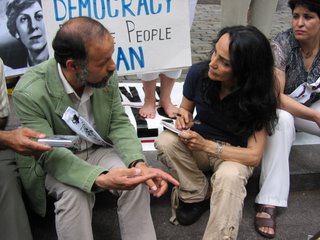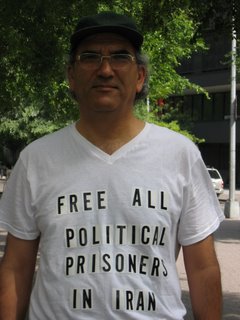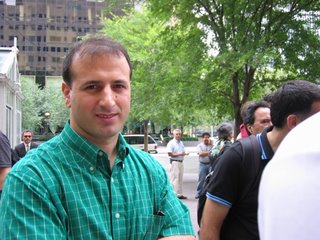Account of Hunger Strike with Akbar Ganji at UN July 15 2006

“Perhaps we can gather 10-15 people to discuss and outline the path to freedom. The days of heroes that descend from the sky are gone. We have to work with the people that are amongst us here on earth. Moreover, we shouldn’t rely on me, or any other leader to make a democracy. People come and go. Rather we should rely on our ideas to make our new democracy.” Akbar Ganji
Here are my observations of the Hunger Strike event for freeing Iranian political prisoners that took place in front of the United Nations Headquarters in New York. When I arrived, organizers were placing signs up here and there. They were very nice big signs, such that my dinky homemade one looked pale in comparison. The organizers were very dedicated. Two organizers in particular were wearing the Hunger Strike badge and they were working so hard. They were putting up signs here and there in the heat and not having eaten at all. I spoke with a few of the others present. One individual said that he decided to come at the last minute. “I normally stay away from politics, but this time, something is different.” He exclaimed. We talked about how the Islamic Republic of Iran has such a savage and violent nature. One of the people present told me that the Islamic Revolution was violent in nature from the beginning. He told me that back in the late 70s the demonstrators would chant “edam”, meaning “hanging” for the loyalists of the regime before the Islamic Republic of Iran. I didn’t know that. I took a flier that was being circulated, but I didn’t really read it at the time, I just tucked it away in my notebook.
When Ganji’s arrival was announced all of the sudden the crowd was energized. People held up their signs, they chanted “freedom for political prisoners in Iran”, “Democracy for Iran”, “Justice for Iran”, “Democracy yes, Theocracy no” and Akbar Ganji was given flowers. He walked around shook people’s hands. Akbar Atri was in the crowd also. He shook Ganji’s hand and they kissed each other’s cheek, the customary Iranian greeting. First Akbar Ganji had to give interviews to CNN, Fox News, The New York Times and I think maybe one other news media. For one of the interviews we gathered around Ganji holding our signs. Among the crowd, a man lifted his two children up in his arms so that they could see. Later Ganji sat on the steps and gave another interview with a sharp Iranian reporter. She came across as very intelligent and seasoned in her field of journalism. Then Akbar Ganji spoke, in a very soft voice, and we all listened.

Akbar Ganji emphasized as to the extreme dire conditions that the prisoners in Iran are under and that political prisoners must be freed.
He spoke about the need for the world to become aware of Iran’s Freedom, Human Rights and Democracy movement. He noted that in his conversations with various prominent figures in West that the message was the same: the world will not tolerate a nuclear Iran and unless something changes they will attack. Ganji said that we Iranians need to establish a democracy or prove that a democracy movement is in existence in Iran to prevent an attack on the country. He said that he was told by the West that they see how violent Iran is to its own people, what kind of a harsher treatment should they expect of a nuclear Iran towards the world? Ganji also pointed out that an attack on Iran would hurt the Democracy movement as well, because then all people struggling for it will be accused of treason.
Akbar Ganji stressed that Iranians need to let the world know that we want freedom and we want democracy. He said many believe that if Iranians don’t want war with the West, then that means they will support the Islamic Republic. He stated that this does not need to be the case. We don’t have to support the Islamic Republic of Iran just because we don’t want war. He said that many Middle Eastern countries result in a dictatorship because they have oil. He emphasized that not all countries without oil are democratic either, but that oil does seem to contribute for the tendency of a country to become a dictatorship.

Akbar Ganji stressed the need for tolerance and that Iranians need to learn how to put their differences aside and live with with each other. He pointed out how in a democratic country all would have the right to exist. Shahi people, democrats, Islamic, all should be able to live peacefully side by side. “Everyone has the right to live with their own ideas.”
He also noted that he is not the leader of the democratic movement. “We need a leader who has a deep perception of the issues, one who is gentle and promotes peace, not one who is violent and advocates brutality” he exclaimed. “Perhaps we can gather 10-15 people together to discuss and outline the path to freedom. The days of heroes that descend from the sky are gone. We have to work with the people that are amongst us here on earth. Moreover, we shouldn’t rely on me, or any other leader to make a democracy. People come and go. Rather we should rely on our ideas to make our new democracy.”

He pointed out that Iranians can’t just talk about freedom, Human Rights and Democracy anymore. We have to be brave, and active, we cannot achieve freedom otherwise. One individual in the audience asked for a clarification on his definition of democracy. “Are you working for a democracy under the umbrella of the Islamic Republic of Iran, (Khamenei)?” Akbar Ganji smiled and replied ” I thought I was clear, I am telling you that I want those in charge of the Islamic Republic of Iran to step down and I am advocating the creation of a brand new democratic Iran.”
During the Question and Answer session it started to drizzle. One of members of the audience took an umbrella and held it above Akbar Ganji’s head. Akbar Ganji paused, and said:” Rain is one of the most beautiful phenomena in nature. Please don’t take the rain away from me.” The individual removed the umbrella. One could not help but feel so shallow as to take the rain for granted, and only imagine that Ganji’s deep appreciation for it could be stemming from his hard days in Iran’s prison.
A question came up in regards to how in the early days of the revolution people were chanting for the execution of loyalists to the Shah’s regime and if the same was to be applied to this change in Iran. Akbar Ganji replied: “We are not interested in filling Iran’s jails nor do we have the intention of using Iran’s hanging scaffolds.”
Another question arose about the West’s role in causing the creation of Iran’s current dictatorhsip. Ganji responded that the West admits that they had a role in Iran’s political affairs and they confess that it was a mistake to do so. What are we supposed to do? There is no alternative but to move forward and try to correct the situation in Iran.
Ganji patiently answered as many questions as he could. Then he left for the day, with the promise to return the next. For the remainder of the evening the demonstration schedule was to stay until 9:00 pm and hear others amongst them speak.
The next day, I looked back at the flier that was given earlier. It was about how one of the demonstrator’s husband, and two brother-in-laws as well as 14 other friends were arrested and then executed in Iran’s prisons. Her relatives and friends were buried in Khavaran mass graves and they were never given the exact reason as to why their families were murdered by the Islamic Republic of Iran. The author of the flier also indicates how she and her toddler children were put in prison as well and that her sister-in-law had to give birth to her second child in prison. I will type out the flier verbatim in a separate post. Reading her flier, it makes me want change all the more. Did the Islamic Republic of Iran really think that their awful crimes would never become known to the people?
I would like to thank the organizers of the demonstration. They truly put a lot of hard work into making the event a success.




0 Comments:
Post a Comment
<< Home